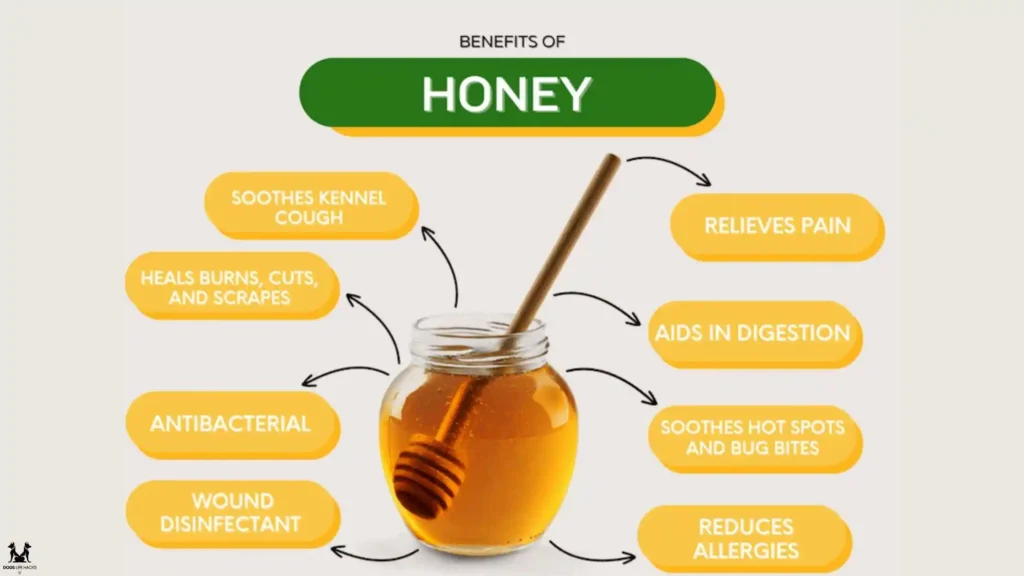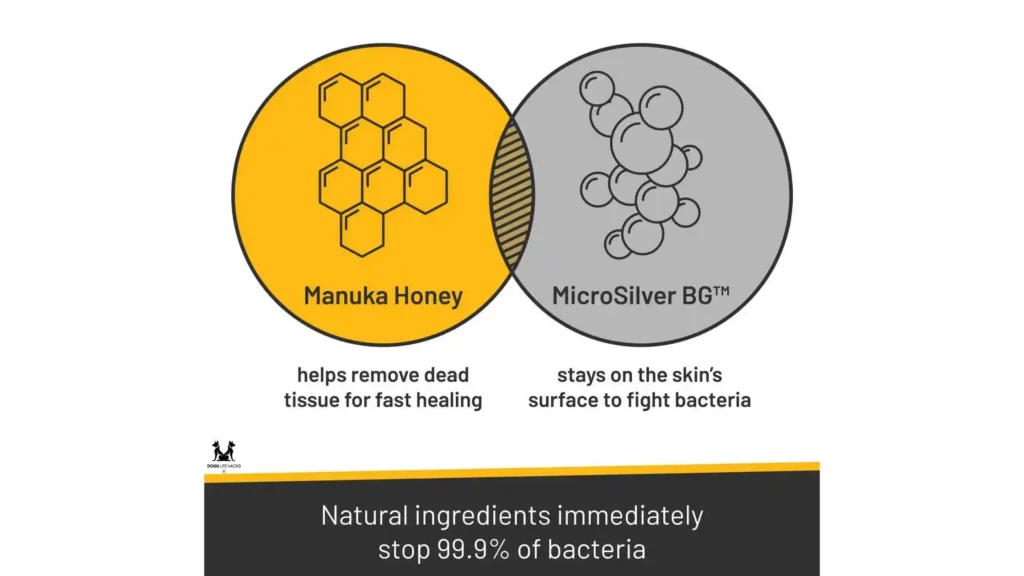Can Dogs Eat Manuka Honey? Perk or Danger? Surprising Facts
For dogs, different kinds of honey benefit them. But, dog owners are concerned about manuka honey and always question Can Dogs Eat Manuka Honey?
Manuka honey has attracted a lot of attention due to its health benefits, especially for humans and dogs. Let’s discuss everything that a dog owner must know about Manuka honey ranging from its health benefits to how much should be given to dogs will be discussed here.
This article fully explores what Manuka honey means for your dog in terms of benefits and drawbacks.

Health Benefits of Manuka Honey for Dogs
Can Dogs Eat Manuka Honey? According to medical research and dog nutritionists, Manuka honey is a natural tasty treat with health benefits for dogs. Loaded with antioxidants, vitamins, and minerals, Manuka honey has the potential to provide your dog with the nutrients he/she requires. The first one is the antioxidant effect which aids in eliminating free radicals in our body and strengthening the immune system. This can especially be of great benefit for immunosuppressed dogs or for those who are recovering from a disease.
Also, Manuka honey contains methylglyoxal (MGO), a compound that has proved to be effective in eradicating bacteria. It may also help to improve overall gut health as well as fight bad bacteria, which could help minimize known health problems within dogs such as diarrhea. It was also found that Manuka honey contains natural enzymes that are important in reducing inflammation and will be useful for dogs with joint problems or skin ailments.

Here are the main benefits of Manuka honey for dogs:
- Antioxidant Effects:
- Eliminates free radicals
- Strengthens the immune system
- Beneficial for immunosuppressed dogs or those recovering from illness
- Methylglyoxal (MGO) Content:
- Effective in eradicating bacteria
- May improve overall gut health
- Helps fight bad bacteria
- Potentially reduces diarrhea
- Natural Enzymes:
- Reduces inflammation
- Useful for dogs with joint problems
- Helps with skin ailments
Best Honey for Dogs
Honey as a treat on its own does not come in the same form for your dog just like any other honey you would normally find in your kitchen but the question is Can Dogs Eat Manuka Honey?
Manuka honey is often considered to be one of the best choices as far as antimicrobial activity is concerned, which is accountable to its MGO levels. To capture all the beneficial compounds it is important that the honey is chosen to be raw and unprocessed.
As you purchase the Manuka honey, choose the honey with a high UMF (Unique Manuka Factor) because it tells how good the honey is. Some of the best Manuka honey brands that one may consider include Comvita which is one of the biggest manufacturers of Manuka honey, Manuka honey, and Wedderspoon. The last step is always looking at the label to make sure the honey is completely natural and has no other components added to it.
Can Dogs Eat Manuka Honey?
Yes, Manuka honey is considered safe for dogs but it should be fed in small amounts. Manuka honey contains other properties as compared to typical honey that makes it more suitable for dogs. However, the choice of the supplement may have an impact on the health of your dog hence it has to be considered before incorporating it in the diet of the dog.

For instance, a dog that has diabetes should not be fed honey because honey has many sugars. As with any other human being, dogs that are one year old and below and dogs whose immune system is very weak should take Manuka honey under the prescription of the veterinarian. Compared with other honey nuts, Manuka honey is non-gas producing and has more nutritional value for the human body.
Manuka Honey Dosage for Dogs
It is important to find out how Dogs Eat Manuka Honey to avoid having a bad effect. Typically, the rule of thumb is to feed your dog half a teaspoon per 10 pounds of the dog’s weight daily. However, it is good to begin with a small amount of this supplement just to see the impact it makes on the dog.
Dosage of Manuka Honey for Dogs:
- Small Dogs (under 20 pounds): Start with ¼ teaspoon.
- Medium-Sized Dogs (20-50 pounds): Use ½ teaspoon.
- Large Dogs (over 50 pounds): Up to 1 teaspoon.
Dogs and Honey Allergies
Can Dogs Eat Manuka Honey with Allergies? Most dogs are safe from the effects of manuka honey, although some may have reactions of allergies to their skin. Signs of a honey allergy in dogs include itchiness, skin redness, rashes, vomiting, or diarrhea. In some unusual circumstances, a more severe type of reaction can be observed, known as anaphylaxis, which will need veterinary intervention.
In case any of these signs are observed after consumption of Manuka honey by your dog, then it is wise to stop the use and seek advice from your veterinarian. However, it is advisable to give Manuka honey to your dog in small portions to detect any adverse reactions the dog shows. You have to begin with a small quantity and see for any symptoms of allergy for the next 24 hours.
Raw Honey for Dogs
Raw honey, including Manuka honey, is often preferred over processed honey because it retains more of its natural nutrients and enzymes. Unlike processed honey, raw honey isn’t heated or pasteurized, so it contains beneficial compounds like pollen, propolis, and natural enzymes. These components can support digestive health, boost the immune system, and even provide relief for dogs with seasonal allergies.

However, it’s crucial to ensure that the honey is high-quality and free from contaminants. Manuka honey is particularly valued because it’s raw, unpasteurized, and contains high levels of methylglyoxal, giving it potent antibacterial and healing properties. This makes it a better option for dogs, especially if you’re looking to address specific health issues like wounds or infections.
Here’s a comparison table for Raw Honey vs. Processed Honey, focusing on their benefits for dogs:
| Feature | Raw Honey | Processed Honey |
|---|---|---|
| Processing | Not heated or pasteurized | Heated and pasteurized |
| Nutrient Content | Retains natural nutrients and enzymes | Reduced nutrients and enzymes |
| Beneficial Compounds | Contains pollen, propolis, natural enzymes | Lacks most beneficial compounds |
| Digestive Health Support | Supports digestive health | Less effective for digestive health |
| Immune System Boost | Boosts the immune system | Less effective in boosting immunity |
| Seasonal Allergy Relief | Provides relief for seasonal allergies | Less effective for allergy relief |
| Antibacterial Properties | Contains high levels of methylglyoxal | Lower antibacterial properties |
| Healing Properties | Potent antibacterial and healing properties | Weaker healing properties |
| Quality Assurance | Ensure it’s high-quality and free from contaminants | Quality may vary, often less controlled |
Manuka Honey for Dog Wounds
Can Dogs Eat Manuka Honey with Injuries? Manuka honey is very effective in providing natural remedies when it comes to handling minor injuries that are likely to affect your dog such as cuts as well as burns. Due to its high concentration of antibacterial properties, it can also reduce the chances of getting an infection and fast healing. Applying Manuka honey on the skin means that the surface is kept moisturized to facilitate the reduction of inflammation and promote the regeneration of tissues hence preventing the formation of scars.

If applying Manuka honey for wound healing, one should first wash the wound with water and a weak antiseptic solution. Then applying a thin layer of manuka honey to the area with the infection or inflammation will suffice. As for this remedy, you can use a bandage to avoid your dog licking the sores, which will prompt him to chew it off. To treat your wound with honey just change the dress and apply honey one or two times within a day until the wound is healed. It is however important to seek the vet’s advice when treating an injury, and especially when it is deep, or has symptoms of an infection.
Manuka Honey Side Effects in Dogs
Manuka honey has higher antibacterial activity due to the MGO content in it as compared to all other types of honey. This compound makes Manuka honey have properties that are effective in combating negative impacts of bacteria making it a natural treatment for bacterial infections in dogs.
For this reason, while antibiotics create a condition that may foster the growth of dangerous bacteria, Manuka honey creates an environment that does not allow bacteria to thrive.
Primary it’s effective for skin disease, rashes, hot spots, and simple abscesses. Manuka honey can be used externally to decrease bacterial count, control inflammation, and expedite the rate of healing.
For gut-related bacteria within the dog such as digestion, including small amounts of Manuka honey in your dog’s diet will go a long way in promoting a healthy bacterial flora in the gut. However, for severe infections, it should be used only as an additional therapy together with the advice of a veterinarian.
Honey in a Dog’s Diet
Consuming Manuka honey can be beneficial in several ways when included as part of your dog’s diet. It can be a natural source of energy as it contains natural sugars which means that it is perfect for the active dogs that need some boost. This product also aids in digestion so that Manuka honey can be used to calm the stomach as well as support the proper bacterial flora in the intestines.

However, moderation is key. You can add a little Manuka honey to your dog’s food one to three times a week more frequently if you are tackling issues like skin allergies or upset stomachs. Any addition of these ingredients in a quarter to half of a teaspoon is enough to provide a lot of health benefits. Just remember to monitor your dog’s daily calorie consumption to avoid making it overweight.
Dog-Friendly Natural Sweeteners
Manuka honey is one of the best natural sweeteners to use for your dog, but other types of natural sweeteners are safe to use on dogs. These include such ones as maple syrup, coconut sugar, and molasses, which will give a little bit of sweetening to your recipe but do not have the same ill effects as xylitol on dogs. However, these alternatives should also be given sparing due to the content it contains which is sugar.
However, when selecting natural sweeteners, there is a need to consider the health of your dog. Such dogs especially those with diabetes or those that are on a diet plan should not be given any sort of sweeteners at all even the natural ones. This is preferred especially when finding manuka honey which has more benefits such as anti-bacterial properties and enhanced immune system as compared to most of the sweeteners.
How to Give Manuka Honey to Dogs
Manuka honey can easily be introduced to your dog’s daily program and create positive changes. It is possible to feed Manuka honey to your dog in many ways based on its choice and diet regime.
- Mix with Food: Try mixing a teaspoon of Manuka honey into your dog’s feed for him to take. The use of this method can be effective if your dog still likes the food that is being served and does not complain of a change of taste. If your dog has a sensitive stomach, then it is advisable to put some honey in a small bowl of the usual meals the pet takes.
- As a Treat: You can feed your dog with Manuka honey by putting a little amount on the food of the dog or a teaspoon. That is why many dogs will readily lick it off much to their enrichment due to the natural sugars that dogs love.
- In Treat Recipes: Add Manuka honey into homemade dog biscuit recipes to make the treats richer in health benefits to your pet. In addition, there are many recipes available that incorporate honey as one of the main ingredients and add some other safe, healthy food for dogs.
- Topical Application: In topical administration, use the Manuka honey on the area required for treatment, such as a sore, or a rash, and apply a dressing if necessary.
Every owner should always supervise his or her dog after feeding him or her with a new food or supplement, including Manuka honey, and it is always advisable to speak with your vet.
Natural Remedies for Dogs Using Manuka Honey
It’s not just delicious to take, Manuka honey is also an effective natural cure for various sicknesses that may affect dogs. Here are some effective ways to use Manuka honey for your dog’s health:
- Wound Care: Manuka honey should be smeared lightly to minor injury zits, abrasion, or burning. It also contains anti-bacterial and anti-inflammatory which makes it effective for use in healing and preventing infection.
- Digestive Issues: You can add a teaspoon or so of the Manuka honey to your dog’s food to aid digestion when your dog is feeling uncomfortable. The honey can therefore aid in the restoration of the healthy balance of gut flora to overcome such problems as, mild diarrhea or constipation.
- Skin Conditions: This aspect makes it possible to apply Manuka honey for dogs that are prone to skin rashes or those having itchy skin. It can also tame the skin and decrease inflammation for certain skin conditions like hot spots, or dry skin.
- Allergy Relief: It also might be effective in treating the common symptoms of seasonal allergies. Its local pollen content can perhaps anesthetize your dog as to allergens, however, it is to be used sparingly, if at all, with veterinary advising.
- Immune Support: Feeding your dog a Manuka honey from time to time will help strengthen his or her immune system and resist diseases and illnesses.
It is crucial to be sure that the use of Manuka honey is appropriate for treating all the health problems of your dog and it is always wise to seek advice from your veterinarian before applying this remedy.
Veterinary Advice on Manuka Honey for Dogs
Like any product, you should consult with a veterinarian before introducing Manuka honey into your dog’s diet. Even though Manuka honey has many advantages, it is of enormous importance to mention that each dog is special, and that is why the kind of diet that is useful for one dog may be inappropriate for others.
- Consult Your Vet: It is recommended always to consult with the veterinarian before incorporating any new supplement into the diet and the same applies to Manuka honey. Your vet will guide you depending on your dog’s records and physical state as well depending on the drugs it may be on. This is especially true for dogs that have certain illnesses and most especially for those on special diets.
- Dosage and Use: However, you should consult your vet to know the amount of the mixture that will be right for your dog, one that is both safe and effective. They can also suggest the proper way of administering the honey and whether Manuka honey should be taken as a therapeutic agent for a certain illness or a medicinal food.
- Monitor Health: It is critical to always visit the vet often and also to discuss any changes that you would like to bring in your pet’s diet like Manuka honey. Your vet will therefore keep evaluating the reactions of your dog and regulate the dosages as may be required with the aim of using the treatment for the welfare of your dog.
Manuka Honey vs. Regular Honey for Dogs

The two types of honey that are particularly useful for your dog include Manuka honey and normal honey and as much as they are good for your dog, they differ in their capacity to perform on the health of the dog.
Here’s a comparison table for Manuka Honey vs. Regular Honey:
| Feature | Manuka Honey | Regular Honey |
|---|---|---|
| Antibacterial Properties | Exceptional, due to high levels of methylglyoxal (MGO) | Minor antibacterial effects |
| Unique Manuka Factor (UMF) Rating | Indicates honey’s strength and therapeutic benefits | Not applicable |
| Healing Properties | Powerful, effective for wound care and digestive support | Less effective for healing |
| Additional Components | Contains propolis and pollen, which enhance health benefits | Generally lacks these components |
| Therapeutic Benefits | High, addresses specific health issues like wounds and infections | Limited, mainly soothes sore throats |
| Natural Energy Source | Yes, but primarily valued for therapeutic properties | Yes, provides natural energy |
| Usage | Used for therapeutic purposes, including wound care and digestive health | Mainly used for soothing and adding sweetness to food |
Conclusively, if one wants to have honey that has immense health gain, and healing factor, then manuka honey trumps it. Real honey however can still be consumed normally while Manuka honey should be used if more health benefits are desired since they are more concentrated in it.
Final Thoughts
Here is something that can be described as a truly exceptional natural dietary supplement for dogs: Can Dogs Eat Manuka Honey? In particular, honey is used in the context of wound healing, as well as to improve digestion, which may provide a variety of benefits if applied properly. Nevertheless, it should be taken in moderation, and always seek your veterinarian’s advice for the suitability of this product for your dog.
Frequently Asked Questions
How much manuka honey can you give a dog?
As a digestive aid, one-quarter of tsp for small dogs or up to one tsp for larger dogs as a single daily dose is advised. Once again, consult a veterinarian to find out how much of the supplement is safe for your particular animal companion.
Is manuka honey safe for dogs to lick?
YES!
Since Manuka Honey is all-natural it can be applied on a wound thinking that when it is licked off it would bring about awful side effects. Protect your pet’s immunity and health with Raw Manuka Honey.
Why do vets use manuka honey?
The antimicrobial and anti-inflammatory nature of Manuka honey makes it beneficial for the treatment of wounds in pets and other animals. Used topically, it may decrease the chances of infection, decrease inflammation, and promote tissue repair and growth to reduce the time it takes to heal.
What kind of honey can I give my dog?
pollen is naturally packed from Quercetin a polyphenol that’s an anti-histamine and can be used to treat itching and watering eyes. To achieve better outcomes, it is recommended to use the raw type of honey that also strengthens the immune system of the pet. Also, you should use local honey because the pollen in it will be that which is going to have an impact on your dog.
Can I give my sick dog Manuka honey?
Yeah, manuka honey can be good for the dog! Kennel cough, dog wound infection, and dog ear infection problems can be solved by Manuka honey but all types of dog allergy cannot be solved by Manuka honey. This beverage is considered suitable for most dogs to consume in small amounts except in a few cases.
Related Blogs
- Safflower Oil For Dogs – Boost & Transform Dog’s Health!
- How to Soothe Dog With Itchy Ears – Here’s the Solution
- Delicious & Good Snacks For Dogs For Happy & Healthy Pets
- Can Dogs Have Almond Milk? Find Dangerous Surprising Truth!
- How Much Zyrtec Can I Give My Dog: Safe Dosage and Benefits
- Easy Dog Eye Discharge Home Remedy to Avoid Vet Visit
